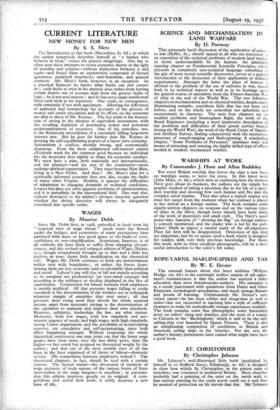Since Mr. Dobb first, in 1928, embodied in book form
his " Sceptical view of wage theory 'I much water has flowed under the bridges, and economists of many persuasions have admitted- with more or less good grace to the faults of over- confidence or over-simplification. Scepticism, however, is of all outlooks the least likely to suffer from changing circum- stances, and this revised and enlarged edition of Wages (Nisbet, is.), though scrupulously brought up to date and a little less positive in tone, shows little modification on the theoretical side. Wages, Mr. Dobb continues to hold, are indeterminate within very wide boundaries ; or rather, the forces deter- mining them are less economic (and so cafeliable) than political and social. Labour's pay will rise or fall not merely according to its marginal net productivity (an over-rated concept) but according to the militancy or docility displayed in the face of exploitation. Competition for labour between rival employers is mainly mythical. All that prevents wages falling to coolie standards is the determination of the workers not to relinquish whatever margin of amenities they may enjoy ; all that prevents their rising Until they absorb the whole national income apart from necessary savings is the determination of the capitalists to maintain and improve their own standards. Reserves, solidarity, leadership, the lawi are what matter. Moreover, both low wages, with low standards and per- manent urgency of needs, and high wages, with high standards, strong Union organisation, and the rioSsibilitY- of accturnillating" reserves, are cumulative and self-perpetuating,:; since both affect bargaining strength. Without reopening the whole theoretical controversy one may point out that the lower wage grades have risen more, over the last thirty years, than the higher—a fact noted but assigned no theoretical- weight by the author ; and that one of the most notable rises of all has been iii the least organised of all forins-oflabour—domestic service. (No competition between emplOyera; indeed !) The theoretical chapters, in fact; should be read with a certain caution. The factual matter—the discussion - of methods of wage payment, of trade unions, of the various forms of State intervention in the wage bargain—is excellent ; in presenta- tion this edition improves greatly on its original. A com- pendious and useful little book, it richly deserVes a rieW lease of life.






































 Previous page
Previous page